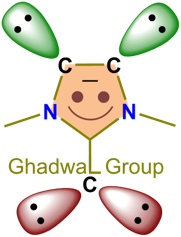Molecular Inorganic Chemistry and Catalysis
advancing low-valent main-group chemistry for sustainable synthesis, catalysis, and materials
Exploring Low-valent main group chemistry since 2012
About Us
We are a synthetic inorganic chemistry research group focused on developing and investigating molecular systems with applications in sustainable synthesis, catalysis, and as building blocks for advanced functional materials. Our work centers on compounds featuring low-valent main-group elements from Groups 13, 14, and 15, encompassing both π-conjugated cyclic and acyclic systems.
Our fundamental research in open-shell main-group chemistry aims to synthesize thermally stable radicals, diradicals, and other high-spin molecules with highly tunable structures, reactivity, and physical properties, including optical, magnetic, and electronic characteristics. Of particular interest are stable singlet diradicals, which offer easily adjustable diradical character and singlet-triplet energy gaps, paving the way for novel functional materials and transformative technologies.
In reactivity studies, particular attention is focused on the activation and catalytic functionalization of small molecules (e.g., H₂, N₂, P₄, CO, CO₂, NH₃, N₂O) to form new molecules and materials. The ultimate goal of investigating stable radicals and diradicals is to develop main-group redox catalytic systems, utilizing custom-designed carbon donor ligands or frameworks (CDLs/CDFs).
The second complementary approach to developing new sustainable catalytic systems using earth-abundant 3d metals (Fe, Co, Ni, Cu) focuses on the utilization of exceptionally electron-rich mesoionic carbenes (iMICs) derived from a 1,3-imidazole framework. A critical strategy in ligand design involves gaining a deep understanding of the stereoelectronic and redox properties of these systems, including the ability to fine-tune them for enhanced performance.
Vision
To pioneer transformative advancements in sustainable synthesis and catalysis by harnessing the potential of main-group redox catalysis, driving innovation in energy materials, and enabling efficient small molecule activation.
Mission
To drive innovation in molecular chemistry and catalysis, advancing the synthesis of future energy materials that enable sustainable solutions for global energy challenges. Through cutting-edge research, we aim to address climate change by developing efficient, eco-friendly technologies that reduce environmental impact while fostering a deeper understanding of chemical processes that contribute to a sustainable and resilient world.

Our Commitment
We believe that the greatest scientific advancements emerge from diverse perspectives and inclusive collaboration. Our research lab is dedicated to fostering an environment where everyone—regardless of background, identity, or lived experience—can thrive, contribute meaningfully, and achieve their full potential. We recognize that academia has a responsibility to lead by example in advancing inclusion, diversity, and equity within and beyond the scientific community.
Core Values
- Inclusion
We strive to create a welcoming and supportive space where all members feel valued and respected. We actively seek to amplify voices that have historically been underrepresented in our field and ensure equitable access to mentorship, resources, and opportunities. - Diversity
Our lab celebrates the richness of perspectives brought by individuals from various cultural, racial, socioeconomic, gender, and disciplinary backgrounds. We believe diversity drives innovation and are committed to recruiting and supporting members with varied experiences and expertise. - Equity
We recognize that equality and fairness are not the same, and we commit to addressing systemic barriers and biases that affect access and opportunity. Our lab actively promotes policies and practices that ensure fair treatment, representation, and advancement for all members.

© 2024 Ghadwal Research Group
Anorganische Chemie und Strukturchemie (ACS), Fakultät für Chemie
Universität Bielefeld, E4-124, Universiätsstr. 25, D-33615 Bielefeld
Tel: 0049-521-106-6167 (Off.); Fax:0049-521-106-6026
E-mail: rghadwal@uni-bielefeld.de
